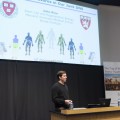John L. Rinn is the Alvin and Esta Star Associate Professor of Stem Cell and Regenerative Biology at Harvard University and Harvard Medical School, and senior associate member of the Broad Institute.
Early in his career, Rinn was one of the first to discover an abundance of RNA molecules emanating from regions of the human genome that are not involved in making proteins. He pursued research into these mysterious RNA molecules for his postdoctoral work, eventually discovering a novel type of genome regulation involving large intergenic noncoding RNAs (lincRNAs). LincRNAs play critical roles in health and disease, and are known to be involved in cancer, immune signaling, stem cell development, and other biological processes.
By using multiple high-throughput genomic technologies, Rinn is discovering and characterizing the functions of these molecules throughout the human and mouse genomes. Recently they have undertaken the ultimate challenge of establishing genetically modified mouse models and revealed lincRNAs are required for life and development, thus representing critical clues to the roles of lincRNAs in genome regulation. By leveraging these multifaceted approaches, from molecules to mice, he aims to untangle the role of the non-coding genome in human health and disease.
Rinn received a B.S. in chemistry from the University of Minnesota, a Ph.D. in molecular biophysics and biochemistry from Yale University, and was a Damon Runyon Cancer Research Foundation Postdoctoral Fellow at Stanford.















